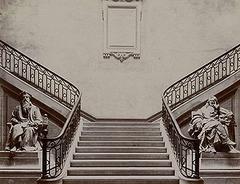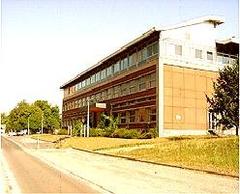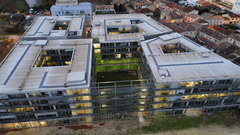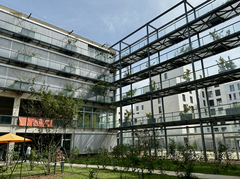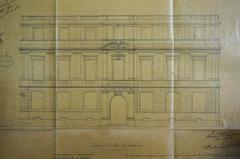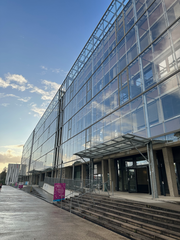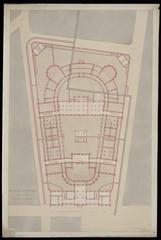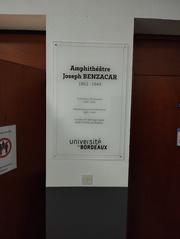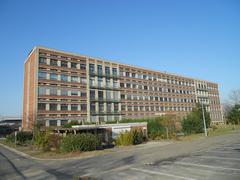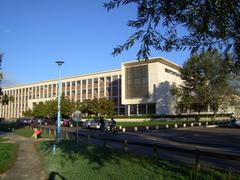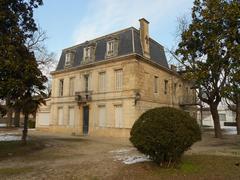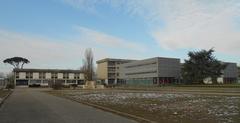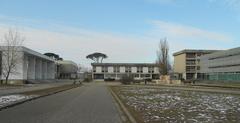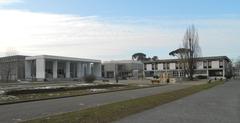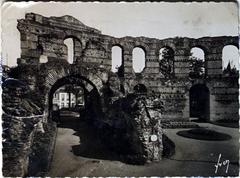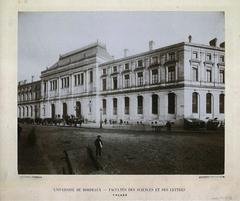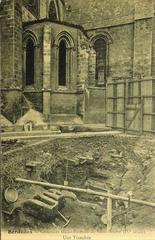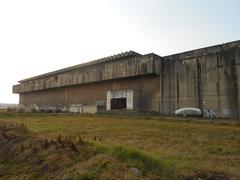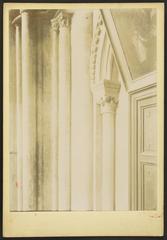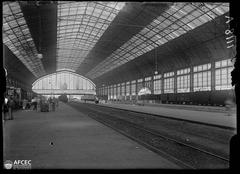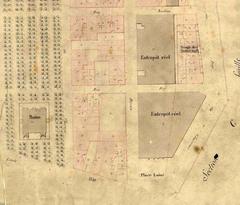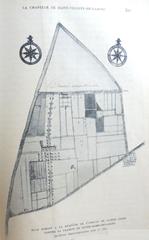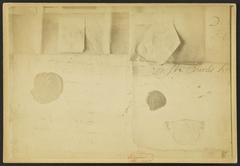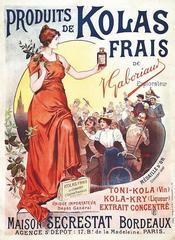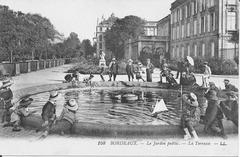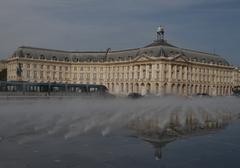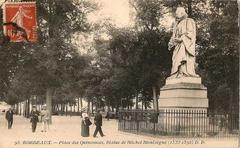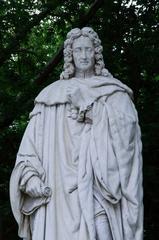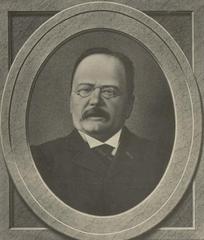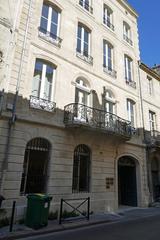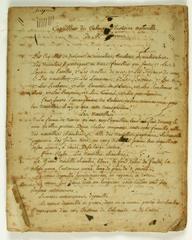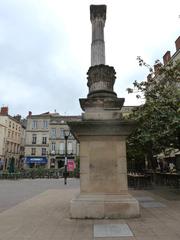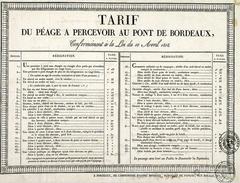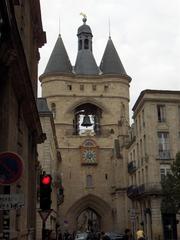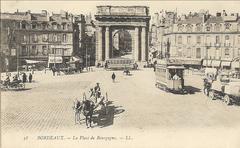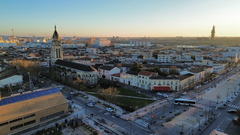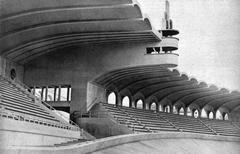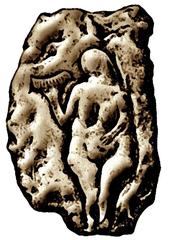
University of Bordeaux Visiting Hours, Tickets, and Historical Sites Guide
Date: 14/06/2025
Introduction to the University of Bordeaux and Its Significance
The University of Bordeaux (Université de Bordeaux) is a cornerstone of academic excellence and historical heritage in southwestern France. Founded in 1441, it is one of the country’s oldest and most prestigious universities, deeply interwoven with Bordeaux’s ecclesiastical, political, and cultural history. The university is situated in a city recognized as a UNESCO World Heritage Site, celebrated for its architectural beauty, dynamic student life, and vibrant cultural scene. Today, the institution hosts over 50,000 students—including more than 6,000 international learners—across multiple campuses, offering a seamless blend of historic charm, modern research facilities, and a strong commitment to sustainability and inclusivity.
This guide provides a detailed overview of the University of Bordeaux for prospective students, scholars, and curious travelers. You’ll find essential information on the university’s historical evolution, campus tours, visiting hours, ticketing policies, accessibility, and recommendations for exploring nearby Bordeaux landmarks. Whether attending special programs, joining a guided architectural tour, or enjoying the city’s cultural events, visitors can expect a rich and welcoming experience.
For up-to-date information on visiting schedules, events, and services, consult the official University of Bordeaux website, the Bordeaux Tourist Office, and the Campus France Guide.
Table of Contents
- Historical Overview
- Visiting the University of Bordeaux
- Exploring the Campus: Layout, Hours, and Must-See Sites
- Visitor Guide: Facilities, Travel Tips, and Services
- Events, Programs, and Practical Information
- Tips for a Memorable Visit
- Frequently Asked Questions (FAQ)
- Contact Information and Support
- Summary
- References and Official Sources
Historical Overview
Medieval Foundations and Ecclesiastical Origins
The University of Bordeaux was established in 1441 under the auspices of Pope Eugene IV and Archbishop Pey Berland, reflecting a broader European trend of church-led education during the late Middle Ages. Initially, it consisted of four faculties: medicine, theology, law, and the arts. The addition of mathematics in 1591 signaled the institution’s evolving academic scope.
Renaissance, Enlightenment, and Revolutionary Upheaval
The university flourished after Bordeaux returned to French control in 1453, later becoming a hub of Enlightenment thought in the 18th century. However, in 1793, the French Revolution led to its dissolution as part of the sweeping reforms against the Ancien Régime. It was only in the 19th century, following Napoleon’s educational reforms, that higher education resumed in Bordeaux.
Modern Transformations and Reunification
Re-established in 1896, the university expanded rapidly in the 20th century, reflecting France’s post-war focus on scientific, technological, and social advancements. In 1970, it was divided into specialized institutions, before reuniting in 2014 into a comprehensive, multidisciplinary university.
Academic and Cultural Impact
A member of the Coimbra Group and the European University Alliance, the University of Bordeaux is internationally recognized for research and teaching in science, technology, medicine, law, social sciences, and the humanities. Its openness to global collaboration and commitment to sustainability define its modern identity.
Visiting the University of Bordeaux
Campus Tours and Visiting Hours
Visitors are welcome to explore the university’s picturesque campuses. Guided tours—offered primarily during the academic year—highlight historic buildings, student life, and current research initiatives. Most main campuses are open from 8:00 AM to 6:00 PM on weekdays, though specific facilities may have unique schedules. Check the official university website for up-to-date tour times and booking details.
Admission, Ticketing, and Access
Admission to campus grounds is free. Certain exhibitions, museums, or special events may require tickets or advance registration. Refer to the university’s events page or the Bordeaux Tourist Office for specifics.
Accessibility
The University of Bordeaux is committed to accessibility. Most campuses feature ramps, elevators, and adapted restrooms, ensuring visitors with reduced mobility can enjoy the university’s facilities. For specific needs, contact visitor services or the relevant Student Life Center in advance.
Nearby Attractions and Special Events
Located in the heart of a UNESCO World Heritage city, the university is close to Bordeaux’s most celebrated historical sites, including the Place de la Bourse, the Water Mirror, and the Saint-André Cathedral. The university also hosts public cultural events, lectures, and exhibitions throughout the year.
Exploring the Campus: Layout, Hours, and Must-See Sites
Campus Structure and Locations
The University of Bordeaux features a multi-site layout, with primary campuses in Talence, Pessac, and Gradignan—together forming Europe’s largest university campus, spanning 187 hectares (u-bordeaux.fr). Additional sites include Carreire (adjacent to the university hospital), Montaigne-Montesquieu (law and economics), Mérignac, Bayonne, Dax, and Périgord, as well as “connected campuses” in Bergerac, Sainte Foy la Grande, and Villeneuve-sur-Lot (University of Bordeaux: Our Locations).
Notable Sites and Buildings
- Talence Campus: The largest site, home to science and technology faculties, the Science and Technology Library, and the Maison de l’Étudiant—a hub for student activities.
- Bordeaux City Center Campuses: Place de la Victoire, Carreire (health and medicine), and distinctive heritage buildings near the heart of Bordeaux.
- Pessac Campus: Focused on law, economics, and the humanities, with the iconic Law Faculty and the University Library of Pessac.
- Cultural Landmarks: The university is near La Cité du Vin (wine museum), the Aquitaine Museum (regional history), and the Grand Théâtre de Bordeaux (Megan Starr: La Cité du Vin, Aquitaine Museum).
Visiting Hours and Ticketing
- Main campuses are typically open Monday–Friday, 8:30 AM–6:00 PM; some facilities, like libraries or research centers, may have different hours.
- Entry to most campus spaces is free; special exhibitions or guided tours may require tickets or advance booking (Bordeaux Tourism: Guided Tours).
Getting Around
Bordeaux’s public transport system—including trams, buses, and bike-sharing—is efficient and well integrated with university sites. Tram B serves Talence and Pessac, and most inner-city campuses are accessible on foot (u-bordeaux.fr).
Visitor Guide: Facilities, Travel Tips, and Services
Student Life Centers (Bureaux de la Vie Étudiante)
Every main campus has a BVE, which provides information on university services, events, and support for visitors and students. The BVE in Talence is at 351 cours de la Libération, Building A22 (Campus France Guide).
Libraries, Sports, and Recreation
All campuses feature modern libraries, study spaces, and sports facilities, open to students and (in many cases) visitors. The campuses’ green spaces and biodiversity trails offer relaxing environments for walks or outdoor activities.
Cultural Activities
Events, exhibitions, performances, and debates are regularly held on campus, often in collaboration with local museums, theaters, and cinemas (Campus France Guide).
Dining
University restaurants and cafeterias provide affordable meals. Surrounding neighborhoods offer bakeries, brasseries, and international dining options (Salt In Our Hair: Bordeaux Food Guide).
Events, Programs, and Practical Information
Bordeaux Summer Schools
From May to August, Bordeaux Summer Schools offer multidisciplinary short programs for international students and researchers. Subjects range from innovation and medicine to social sciences.
Visiting Scholars Program
The annual Visiting Scholars program brings international faculty to collaborate on research and teaching.
Getting There
Bordeaux is accessible by high-speed train (TGV) from Paris (2 hours) and by air via Bordeaux-Mérignac International Airport. The TBM network connects all major university sites with the city center (Campus France Guide).
Accommodation
The Bordeaux Tourist Office lists hotels, hostels, and rentals. For longer stays, student housing platforms are available (Campus France Guide).
Accessibility & Safety
Most university facilities are accessible, and campuses are secure with dedicated safety teams. Emergency number: 112.
Tips for a Memorable Visit
- Plan Ahead: Review campus maps, events, and monument hours online. Some facilities may require reservations.
- Use Public Transport: Trams and buses are reliable. Consider a day pass for unlimited travel.
- Explore the City: Don’t miss Bordeaux’s central landmarks like Place de la Bourse, the Water Mirror, and Grand Théâtre (Voyage Tips).
- Take Advantage of Student Discounts: Museums and cultural venues often offer reduced rates for students and university visitors.
- Respect Campus Etiquette: Smoking is prohibited indoors; quiet zones are enforced in libraries.
- Support Sustainability: Use recycling bins and participate in eco-friendly initiatives (u-bordeaux.fr).
Frequently Asked Questions (FAQ)
Q: What are the University of Bordeaux’s visiting hours?
A: Most campuses are open weekdays, 8:00 AM–6:00 PM. Libraries and cultural centers usually open from 9:00 AM–6:00 PM. Check specific facility hours online.
Q: Is there an admission fee?
A: Outdoor campus access is free. Some exhibitions or events may require tickets.
Q: How do I get tickets for Bordeaux’s historical monuments?
A: Purchase onsite or online via the Bordeaux Tourist Office. Many sites offer free or discounted entry for students.
Q: Are guided tours available?
A: Yes, both the university and city offer guided tours. Advance booking is recommended.
Q: Is the university accessible for visitors with reduced mobility?
A: Yes, most facilities are equipped with accessible features. Contact the university’s accessibility office for support.
Contact Information and Support
- General Inquiries: +33 (0)5 40 00 60 00 (u-bordeaux.fr)
- Student Life Centers:
- Bordeaux: 146 rue Léo Saignat, 33000 Bordeaux, +33 5 57 57 17 79, [email protected]
- Talence: 351 cours de la Libération, Building A22, 33400 Talence, +33 5 40 00 64 02, [email protected]
- Pessac: Avenue Léon Duguit, 33600 Pessac, +33 5 56 84 62 61, [email protected]
(Campus France Guide)
- International Office: University International Section
- Tourist Information: Bordeaux Tourist Office
Summary
A visit to the University of Bordeaux is both an academic and cultural journey. From its medieval founding to its current status as a leader in research and innovation, the university offers free access to beautiful campuses, guided tours, and a welcoming environment. Its prime location in Bordeaux allows easy exploration of the city’s UNESCO-listed monuments, culinary scene, and vibrant student culture. Use official resources and apps like Audiala for up-to-date maps and event information, ensuring a smooth and memorable experience (University of Bordeaux official website, Bordeaux Tourism).
References and Official Sources
- University of Bordeaux Official Website
- University of Bordeaux Admission Portal
- Bordeaux Tourism Office
- Campus France Guide: Bordeaux
- Megan Starr: Bordeaux Things To Do
- Bordeaux Tourism: Guided Tours
- Bordeaux Summer Schools
- University of Bordeaux Visiting Scholars Program
- Voyage Tips: Things to do in Bordeaux
- Salt In Our Hair: Bordeaux Food Guide
Image credits: University of Bordeaux official website
Alt text for images: “Historic main building of the University of Bordeaux”, “University of Bordeaux modern campus in Pessac”, “Students walking on University of Bordeaux campus”
